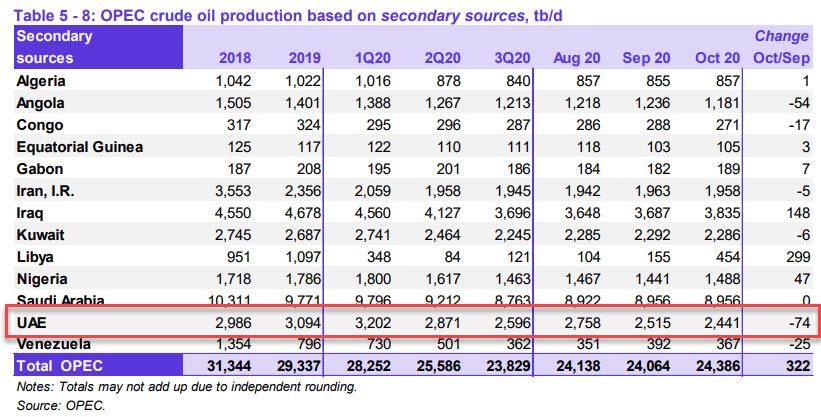OPEC+ Fails To Agree On Output Hike Ahead Of Big Meeting With UAE, Kazakhstan Opposed
One day before a crucial OPEC meeting which could determine if oil trades above $50 or back under $40 in the coming weeks, a panel of OPEC+ ministers failed to reach an agreement on whether to delay January’s oil-output increase, leaving the matter unresolved before tomorrow's meeting.
According to Bloomberg - which cited an anonymous delegate - while most participants including Russian Deputy Prime Minister Alexander Novak in the informal online discussion supported maintaining the production curbs at current levels into the first quarter, the United Arab Emirates and Kazakhstan were opposed. The opposition comes following public complaints from Iraq and Nigeria, which have also indicated they would like to see an end to the production cuts.
As a result, due to the two minor nations' opposition, unless the agreement is revised this week OPEC+ will restart about 1.9 million barrels a day of halted output, potentially pushing the global market back into surplus and sending crude price tumbling after a cautious recovery pushed Brent back to $48/barrel, the highest since March.
"Saudi Arabia will have to lean hard to get an agreement,” said Mohammad Darwazah, an analyst at research firm Medley Global Advisors LLC. “There have been particularly acute rumblings of dissatisfaction with the status quo from Abu Dhabi."
Considering that the UAE is one of OPEC's minor producers, pumping just 2.4 million b/d in October, or about 10% of OPEC's total, it's clear that if OPEC indeed wants to maintain the output cuts - which both Russia and Saudi Arabia are in favor of - then that's what will happen, and today's report is just an attempt to add to an outcome that is already predetermined.
As a reminder, Saudi Arabia and Russia summoned a small group of OPEC+ countries for last-minute talks this weekend, in an apparent effort to forge a consensus before making a final decision at a conference scheduled for Monday and Tuesday, Bloomberg reports. "Despite the lack of an agreement so far, negotiations in the coming days could still result in a deal, said another delegate."
Not "could," but will, because when 90% of OPEC+ producers agree that the price of oil has to go up with at least another three to six months of production cuts, that's what will happen.
Disclaimer: Copyright ©2009-2020 ZeroHedge.com/ABC Media, LTD; All Rights Reserved. Zero Hedge is intended for Mature Audiences. Familiarize yourself with our legal and use policies every time ...
more



